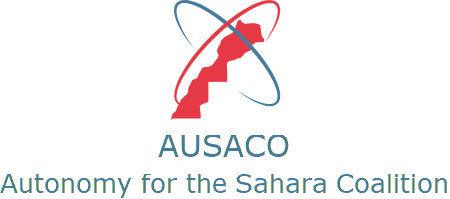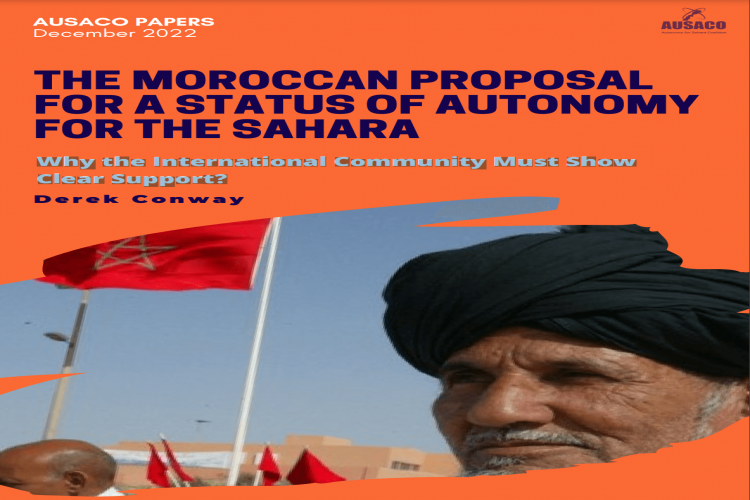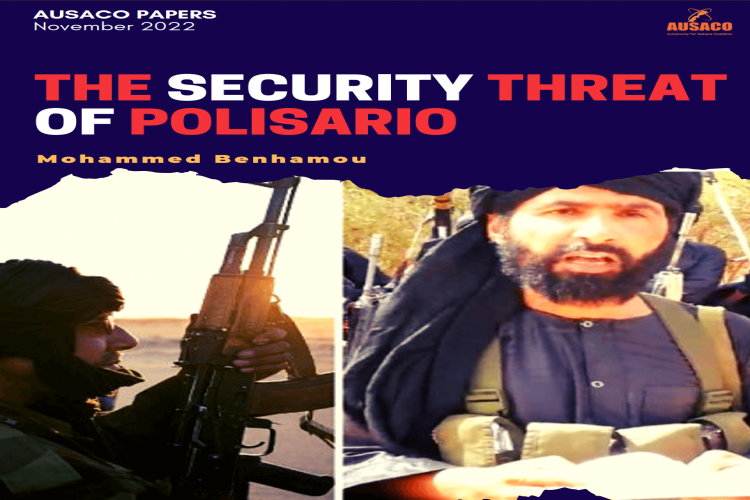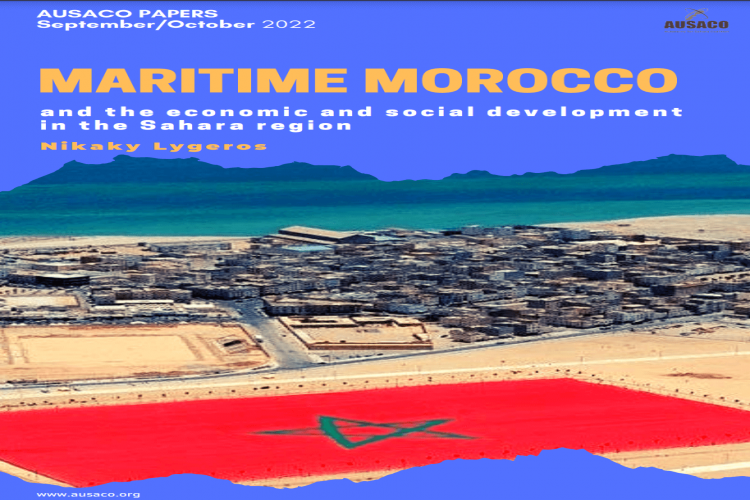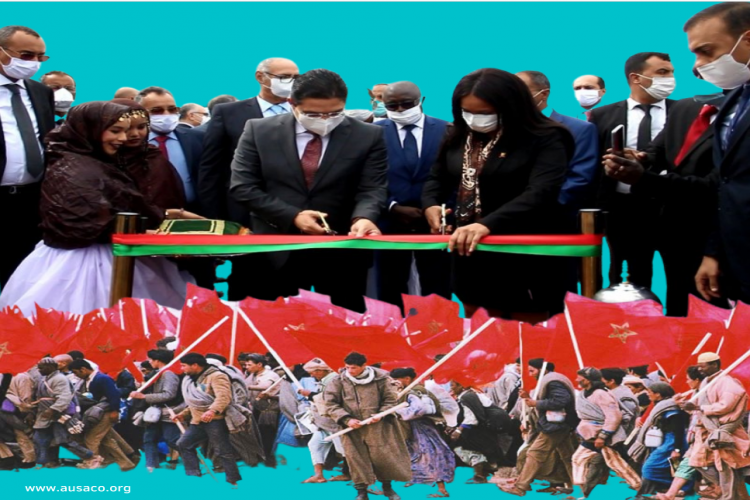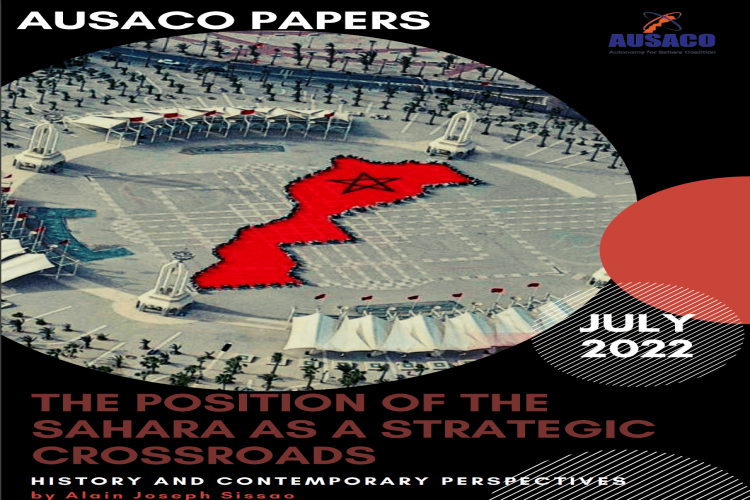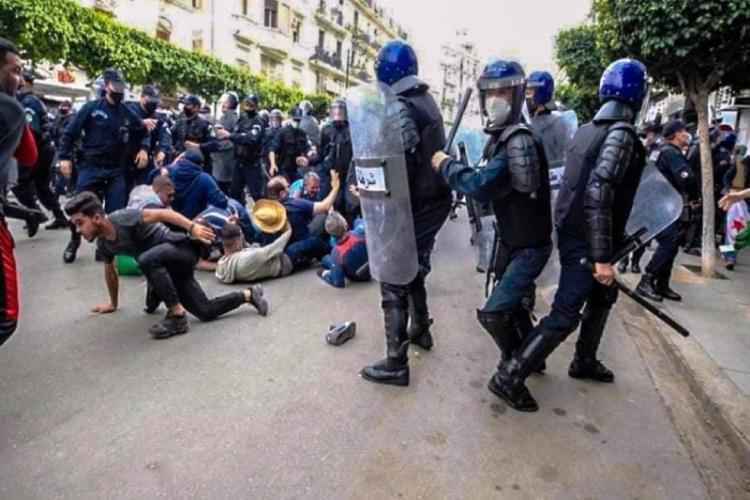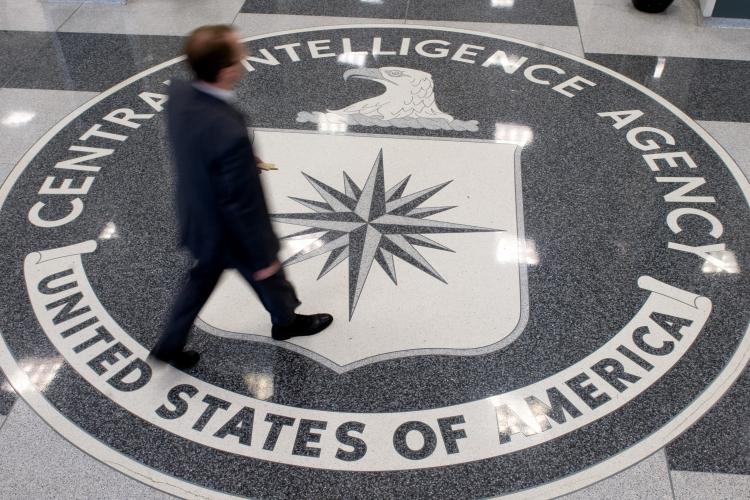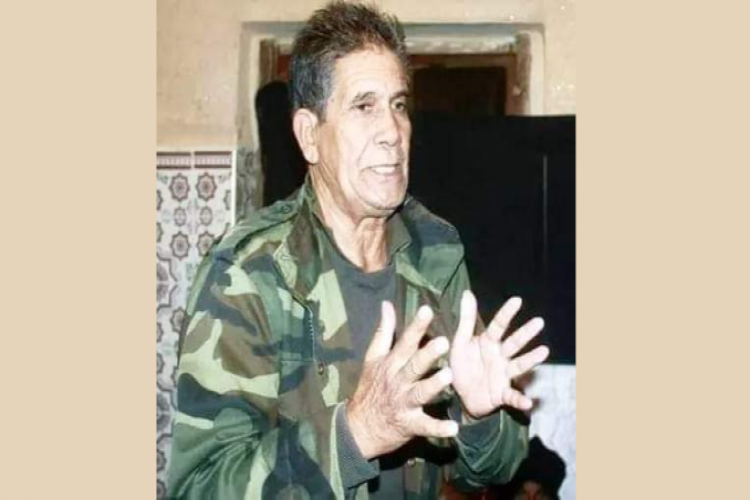| Attachment | Size |
|---|---|
| AUSACO PAPER JUNE 2022.pdf (26.14 MB) | 26.14 MB |
The “Polisario Front” was created by Gaddafi's regime and Algeria in the midst of the Cold War, in 1973, in a world then polarized between the communist bloc and the Western bloc. “Polisario” is a remnant of an ideology that is now defunct, but whose traces are still visible in its outdated approaches to the realities of the current world.
The growing international consensus on the Moroccan identity of the Sahara and the reference framework adopted by the international community to reach a definitive solution to the regional dispute over the Sahara not only confirm the “Polisario's” usurpation of an anti-colonial legitimacy that it has never actually enjoyed, but also accelerate the definitive decline of the separatist theses. The separatist project is also part of the expansionism of the Gaddafi regime been directed against Morocco since 1972.
Today, “Polisario” survives only because of the criminalization of Algeria's policy on the question of the Moroccan Sahara, the persistence of which jeopardizes the stability and development prospects of the Sahel-Saharan strip and the Mediterranean region. “Polisario” does not exist independently of the support it receives from Algeria as part of its hegemonic agenda.
This chapter will first review the context of the creation of “Polisario” by Algeria, and will then focus on the growing gap between the theses of this separatist movement and the realities of the twenty-first century. In doing so, we will highlight the inextricable relationship between the decline of “Polisario” and the loss of legitimacy of the Algerian regime.
If Morocco's position has been able to adapt to the mutations that the world has experienced throughout the twenty-first century in a world of continuous change, that of Algeria and “Polisario” has reached the end of its tether.
- A remnant of the Cold War
The programmed obsolescence of “Polisario” is explained by its creation in a historical context that no longer exists. “Polisario” was founded in 1973, in a world bipolarized by the Cold War and a Moroccan Sahara then under Spanish occupation. “Polisario” was created only as the decolonization of the Sahara grew nearer, when it became clear that this could only be achieved through the return of the region to Morocco. Created in the name of decolonization, this movement has not, however, carried out any action of resistance against the Spanish occupier. Its current leader, Brahim Ghali, was also an agent of the Spanish colonial police.
“Polisario” was thus born in a context where Algeria deployed a wide range of mercenary movements as part of its alignment with the Soviet bloc. The proximity between the USSR and the Algerian regime was then known to all. The Soviet Union was committed, in the 1950s, to the anti-colonial movements, including the Algerian National Liberation Front, and once independence was achieved, it provided them with science, technology, weapons and "brotherly advice" as needed. All Algerian generals studied in the USSR or in its satellite countries.
Soviet influence is reflected in all aspects of the Algerian political system. Until 1988, Algeria was inspired by the model of the Soviet one-party, but also of the single trade union and the control of civil society by the intelligence services, also trained in KGB methods. This influence is naturally reflected in the structure of “Polisario”, shaped in the image of the Communist Party in the USSR: It remains headed by a "secretary general" assisted by an "executive committee" of nine members, themselves members of a "political office" of twenty-one people. It is, in short, the typical pyramidal structure found in the majority of Marxist movements.
The separatist movement of “Polisario”, manipulated by the Algerian regime, will join a myriad of terrorist organizations based in Algiers; considered in the 60’s and 70’s as a headquarters for agitators and terrorists of all types. The Algerian capital hosted many African revolutionary movements of Marxist obedience, leaders of the ETA, the terrorist movement of the Spanish Basque Country, Irish activists, Palestinian dissidents or the Movement for the Liberation of the Canary Islands. Among the subversives living through Algiers were Slimane Hoffman, the son of a former German SS, who, along with Messadia, is said to have been behind the assassination of El Ouali, leaders of the Black Panthers, terrorists of the Japanese Red Army, and the terrorist Carlos, known for his attacks in Paris and his taking of the OPEC hostage.
The separatist project was intimately integrated into the logic of the blocs. In fact, in support of the project, a large number of advisors from East Germany (GDR) and militiamen from Cuba were deployed alongside the “Polisario” in the acts of aggression it carried out against the populations of the Moroccan Sahara. With the exception of a few militiamen from the region, including Mauritanian and sub-Saharan mercenaries, the armed elements of “Polisario” were what Algeria and the communist countries (starting with Cuba with more than 15,000 soldiers) made available to this project.
A CIA report dated February 4, 1982, confirms that the rocket launchers used by “Polisario” in the Moroccan Sahara constitute additional proof of the support of Gaddafi's Libya to “Polisario”[1]. Indeed, these rocket launchers produced by North Korea were only in the possession of Libya and Egypt at that time.
However, it was the battle of Amgala, in which dozens of Algerian officers were captured by the Royal Armed Forces, that provided the most striking evidence of Algeria's military involvement in the regional dispute over the Moroccan Sahara.
On February 28, 1976, the Algeria-based “Polisario” unilaterally proclaimed the "Sahrawi Arab Democratic Republic” (SADR). This proclamation was a violation of international law in more than one respect. First, it was a denial of the principle of self-determination: By proclaiming a so-called "Sahrawi republic", Algeria usurped the exercise by the Sahrawi population of their right to self-determination which, under international law, can take the form of independence, integration, or any other form decided by the people. It was above all a serious violation of the paramount principle of the territorial integrity of states as stipulated in the United Nations Charter.
In an attempt to give some semblance of legitimacy to this emanation of its own designs, Algeria deployed a “diplomacy of the checkbook” to coerce other countries into recognized the so-called "SADR". Unsurprisingly, the majority of recognitions came from states belonging to the socialist bloc.
The politics of the Cold War provides the ideal analytical framework for understanding the genesis of the Moroccan Sahara. However, the analysis must be complemented by an examination of the position of the issue of the Moroccan Sahara as an internal political issue for the Algerian regime.
- The Moroccan Sahara question as an issue of internal Algerian politics:
Algerian policy on the Moroccan Sahara issue cannot be dissociated from the particular structure of the Algerian state, which, according to the political scientist Clement M. Henry[2] , constitutes a "bunker state" where the government rests less on a popular base than on its control of the country's oil resources and a so-called "revolutionary” legitimacy. The Algerian regime has thus integrated the defense of the principle of self-determination and decolonization into the discourse that it has assembled as part of its quest for legitimacy, but with a real obsession with the Sahara, as Arnold Hottinger notes: "the struggle of the 'Saharan people' against 'Moroccan colonialism' recalls the Algerian war of independence, which still remains the central myth of the state”.[3]
Thus, Algeria very quickly became the champion of a selective and truncated reading of the principle of self-determination, equating it with secession. As Maurice Flory points out in his analysis of Algeria's oral presentation to the International Court of Justice, Algeria proposed a "very novel analysis" of the right to self-determination, according to which this principle amounts to independence.
Algeria has integrated this tendentious reading of the right to self-determination not only as part of its agenda to consolidate its hegemony over North Africa, but also as part of a strategy to legitimize the power in place. Thus, the Moroccan Sahara issue has been elevated by the government to the rank of a national cause. This is what emerges from Arnold Hottinger's analysis, in which he states that "this serious question arouses the passion all Algerians, people and government: the prestige of Algeria and the future of its entire Maghreb policy are at stake”.
Based on the importance of the Moroccan Sahara issue for the Algerian government, all successive Algerian presidents have maintained a hostile line to Morocco's interests. Boumediene's Algeria hoped to impose itself as the only power in the Maghreb and to weaken its Moroccan neighbor, which had supported and defended it during the colonization of the country by France. This maximalist policy was implemented at the expense of the regional integration of the Maghreb, and by extension at the expense of the Algerian population.
A short-lived hope was born when Mohammed Boudiaf, now president of the country, publicly acknowledged that the Moroccan Sahara issue is indeed a problem between Algeria and its Moroccan neighbor. Having lived in exile in Morocco for nearly 30 years, Boudiaf was determined to end the conflict. Unfortunately, he was assassinated in June 1992 under circumstances that remain unresolved to this day.
In turn, Abdelaziz Bouteflika tried unsuccessfully to reactivate the nationalist sentiment to establish his legitimacy in the face of the military establishment. Indeed, by appearing to revive President Boumediene's strategy on the Moroccan Sahara issue, the Algerian head of state was trying to adopt a populist policy, in order to awaken a nationalism that could overcome the divisions, hatred and tensions generated by seven years of civil war.
A sign of the vacuity of the slogan of self-determination in the Algerian position on the Sahara and of its vocation to serve the domestic legitimization efforts of Algerian power, President Abdelaziz Bouteflika had proposes to the former Personal Envoy in 2002 the partition of the region[4]. If need be, this proposal confirmed that only geostrategic interests really motivate Algeria's positions, and not its commitment to the principle of self-determination.
The Hirak pro-democracy movement has accentuated Algeria's internal difficulties and, paradoxically, intensified Algeria's hostility on the Moroccan Sahara issue. The demonstrations began on February 16, 2019[5] in Algeria to protest initially against the bid for a fifth presidential term of Abdelaziz Bouteflika, then suffering from severe aphasia following a stroke in 2013, and aftewards against his plan to remain in power at the end of his fourth term in the context of transition.
Of a growing and unprecedented scale for now more than two years, these demonstrations, which mainly take place on Fridays (and Tuesdays for students), forced Bouteflika into resigning on April 2, 2019 after his return from a Swiss hospital. On April 9, 2019, one week after Bouteflika's resignation, the National People's Assembly and the Council of the Nation, meeting in joint session, chose Abdelkader Bensalah, then president of the upper house, as interim head of state[6]. His main task, apart from managing the country with reduced powers, was to organize early presidential elections within 90 days of his appointment. The Hirak protests continued after the public announcement of these decisions, provoking a violent repression[7].
Although a first ballot was announced for July 4, it was finally postponed to a later, undetermined date, infuriating the protesters. Many demonstrators were arrested. The elections were finally held on December 12, 2019, during which Abdelmadjid Tebboune was elected president.
These Hirak demonstrations, which resumed at the end of February 2021 after a year's suspension due to the pandemic, are taking place in a climate of increased repression, while the government wants to impose its electoral "roadmap" through early legislative elections on June 12, without taking into account the demands of the street. The authorities, for their part, continue to target political opponents, activists and journalists, multiplying legal proceedings and convictions.
The Algerian regime is currently resorting to the traditional themes of the external enemy and the alleged support for the right to self-determination to evade the demands of the street. These tactics are reflected in a radicalization of Algeria's positions on the Sahara issue, moving from the hollow slogan of support for the "right to self-determination of the Saharan people" to explicit insults to Morocco's institutions. Thus, more than fifty statements by Algerian leaders have been devoted to the question of the Moroccan Sahara. These constitute evidence of the radicalization, or even regression, of Algerian positions towards the ideological stances of the 1970s.
The “Polisario's” theses are now outdated both by the irreversible dynamics of Morocco's sovereignty on the ground, the questioning of its legitimacy, as well as by the frame of reference adopted by the UN to reach a definitive political solution to the dispute over the Sahara. The international community, aware of the weight of the Cold War that still weighs on Algeria's policy on the Question of the Moroccan Sahara, and by extension on the ideology and practices of “Polisario”, is turning to Morocco's sovereignty as the sole framework for resolving the Question of the Moroccan Sahara. Faced with the abyss that is opening up in front of Algeria and the “Polisario”, the tandem locks itself, as we shall see below, in the tactic of the permanent flight forward, even if it means accelerating the definitive decline of their theses.
- The international support for Morocco's positions
Since 2000, 45 states have withdrawn their recognition of the so-called "SADR", a process that has accelerated significantly in recent years. Thus, in Latin America, the continent that concentrated the most countries recognizing the “SADR”, only nine countries still recognize this entity, compared to 18 in 2000. Today, 35 Latin American countries, or more than two-thirds of the countries in the region, do not recognize the so-called “SADR”, leaving some countries belonging to the former Soviet bloc on the side of illegitimacy.
In Asia, only North Korea and Timor Leste still recognize the so-called “SADR”. In Europe, no country recognizes this fake entity.
In Africa, only 18 countries continue to recognize the so-called “SADR”, a number set to shrink rapidly as African countries and their institutional families rally behind Morocco's legitimate rights. In 2019, 28 heads of state sent a motion to the 27th African Union Summit calling for the suspension of the so-called “SADR”, including leaders of countries maintaining a nominal recognition vestige of an ideological past that has now passed in favor of a firm commitment to the side of legitimacy and international legality.
In 2017, Morocco was triumphantly welcomed into the African Union, ending a 33-year absence during which Algeria had been desperately trying to manipulate the pan-African organization in favor of separatist theses.
Within the African Union, the 31st Summit of the African Union adopted Decision 693, which established the exclusivity of the United Nations as the framework for the search for a political solution, the exclusion of any process parallel to that of the United Nations, and the support of the AU for the efforts of the United Nations, in line with the resolutions of the Security Council. By doing so, the African Union has put an end to the long manipulation by Algeria and the “Polisario” of Pan African bodies, including the Peace and Security Council, for their purposes hostile to the territorial integrity of Morocco.
In tandem with Algeria's and the “Polisario's” loss of support, the international consensus around the Moroccanness of the Sahara is experiencing an irreversible dynamic, materialized by the opening of 22 Consulates General in the cities of Laayoune and Dakhla, mostly by African countries. As a sign of the magnitude of the decline of the “Polisario”, of the seventeen African countries that have opened Consulates General in Laayoune or Dakhla, seven had been recognizing the so-called “SADR”.
In the same vein, twelve Pacific states adopted the Laayoune Declaration on February 29, 2020, during the Morocco-Pacific Island States Forum held in Laayoune, in which they recognize that the Sahara is an integral part of Morocco's national territory and that the Autonomy Initiative is the only realistic, serious and credible solution to the regional dispute over the Moroccan Sahara. Six Pacific countries among the parties to the Laayoune Declaration had recognized in the past so-called “SADR”.
Similarly, the United States of America, the penholder of all Security Council resolutions on the Moroccan Sahara issue, recognized on December 10, 2020, Morocco's full sovereignty over the Sahara and the Moroccan Autonomy Initiative as the only basis for definitively resolving the regional dispute. Forty-two countries supported this decision at the International Ministerial Conference on Support for Autonomy under Moroccan Sovereignty, held in Rabat on January 15, 2021 under the chairmanship of Morocco and the United States.
All these developments are based on the relevance and solidity of Morocco's positions, but also on the irreversible dynamics of the Moroccan identity of the Sahara on the ground, including through the colossal development efforts that the Kingdom leads in the region. The benchmark chosen by the UN to reach a final solution to the regional dispute over the Moroccan Sahara reflects this dynamic.
- The new UN frame of reference to achieve a final solution to the regional dispute over the Sahara :
The UN Security Council has been able to adapt to developments in the Moroccan Sahara issue since 1975, which have successively reinforced the approach that Morocco has always advocated to achieve a final settlement of the issue. Thus, after having tried in vain to implement the Settlement Plan proposed in 1991, and in which Morocco participated in good faith, the Security Council abandoned the referendum option in 2001, and since 2004 has been moving towards a mutually acceptable political solution as the only way to settle the Moroccan Sahara issue definitively, laying the foundations of the political process.
The presentation by the Kingdom of Morocco of the Moroccan Initiative for the Negotiation of an Autonomy Statute for the Moroccan Sahara region[8]constitutes the basis of the political process conducted under the aegis of the United Nations. Thanks to this Initiative, several formal and informal rounds have been held under the aegis of successive Personal Envoys of the UN Secretary General.
Based on the realities on the ground, the Personal Envoy of the UN Secretary General, Mr. Peter Van Walsum, declared in April 2008 before the Security Council that "the independence of the Sahara is not a realistic option", thus putting a definitive end to the chimera of an independent "state" in the Sahara that Algeria has been striving to promote for over half a century.
Mr. Antonio Guterres began his term as UN Secretary General with the desire to inject a new momentum into this process, which resulted in the appointment of the former President of the Federal Republic of Germany, Mr. Horst Kohler, as his Personal Envoy. The latter organized the holding of two roundtable meetings in Geneva, with the participation of Morocco, Algeria, Mauritania and the “Polisario”, which saw substantial discussions on the definition of the political solution and on the cost of the non-Maghreb. I have to mention that the United Nations has managed to coerce Algeria into sitting at the negotiations table. Algeria could therefore no longer present itself as a mere spectator or an observer, but only as the architect of the problem, if not the problem itself.
The substance of the discussions during the round tables in Geneva highlights the profound gap between the theses of “Polisario” and the new realities of the 21st century. The question of the Moroccan Sahara is being dealt with as a regional dispute with profound repercussions on the future of the Maghreb and Sahel region, and no longer as a question of "decolonization" as the anachronistic theses of “Polisario” would have it.
On the basis of the new impetus given to the political process through the Geneva Round Tables, the UN Security Council adopted resolutions 2414, 2440, 2468, 2494 and 2548, which clearly define the purpose of the political process, namely a realistic, practicable and lasting political solution that rests on compromise, as well as the format of this process—the roundtable meetings. In the same spirit, these resolutions recall that only realism and a spirit of compromise will enable the process to reach a political solution.
As a sign of the international community's determination to get rid of the vestiges of the past, the Committee of Twenty-Four, a subsidiary body of the Fourth Committee of the United Nations General Assembly, has been inviting since 2018 the local elected officials of the Moroccan Sahara regions to participate in its work as representatives of the Sahrawi population. Thus, two local elected officials from the Sahara participated in the work of the Regional Seminar held in Granada from 2 to 4 May 2019 as representatives of the population of the Moroccan Sahara.
The basis of this decision is the international community's awareness of the profound changes that the Sahara region has undergone over the past 20 years, marked by the advent of advanced regionalization. As a constitutional principle that is part of the Kingdom's democratic path, advanced regionalization provides for the devolution of broad prerogatives to Morocco's twelve regions, including the two Saharan regions. In the first regional elections in Morocco's history, the two Sahara regions recorded the highest voter turnout of any region in Morocco.
In light of these developments, the Committee of 24 put an end to the myth of “Polisario” as the "legitimate representative" of the Saharan population, which was based on a single UN General Assembly resolution, resolution 34/37, adopted in the context of extreme polarization during the Cold War.
- The decay of a gerontocratic movement:
The failure of “Polisario” to adapt to all of these developments is largely due to its total dependence on its Algerian mentor, who prevents it from renewing its leadership for fear of seeing the movement become autonomous and depart from the maximalist position it has always defended on the Moroccan Sahara issue. Thus, “Polisario” has remained dominated by the same faces as half a century ago. After the death of Mohamed Abdelaziz, who had remained at the head of the movement for 40 years, the Algerian regime placed Brahim Ghali, a former agent in the pay of the Spanish colonial police, at the head of the separatist group.
The game of musical chairs played by the Algerian services to create the illusion of a renewal of “Polisario” leadership has continued to fuel the mass return of Sahrawis to the Moroccan Sahara and the protest in the Tindouf camps, where the sequestered populations have been living without any prospects for nearly fifty years.
Thus, since 1988, the riots that shook the various Algerian cities reached the camps of Tindouf, where several hundred people were killed by the bullets of “Polisario” militiamen. In 2004, it was the turn of new protest movements to emerge in the Tindouf camps, whose slogan was to denounce the farce of the “Polisario's” "congresses" and the exploitation by its leaders of the poverty of the people of the Tindouf camps for personal enrichment.
Protest has also taken the form of disorganized riots in the Tindouf camps, notably in 2014, following the killing of two Sahrawis by the Algerian army. These events were repeated at the end of 2020, when an Algerian patrol in the Dakhla “wilaya” of the Tindouf camps set two Sahrawis on fire, revealing the extent of the Algerian military’s spite for the Sahrawis, whom some Algerian diplomats even call “parasites”.
This questioning of the legitimacy of the “Polisario” is now being carried out by the Saharawi Movement for Peace, an alternative movement "which seeks and advocates a political settlement of the Sahara question within the framework of the political process led by the United Nations[9] . This movement calls on the international community to work towards the revival of the political process and to find a just and lasting solution, in accordance with the Security Council resolutions.
- Criminalization as the future of the “Polisario”:
The prospects for the “Polisario” thus appear bleak, with the vanishing of the geopolitical and ideological ground that saw its birth and the aging of its own leaders. This trend is set to continue in a context where the Algerian state is itself in the grip of a protest movement that shows no sign of abating. The weakness of Algeria's diplomatic levers with the downward trend in hydrocarbon prices, the main source of revenue for the Algerian regime, will increase the relative cost of its support for “Polisario”, to the detriment of its own development policies.
Faced with this lack of prospects, “Polisario” has gradually transformed itself from a simple mercenary organization into a criminal movement with multifaceted links to the transnational organized crime networks that crisscross the Sahelo-Saharan strip. This criminalization of “Polisario” is reflected in several interdependent phenomena whose development goes hand in hand with the displacement of the theses of this movement from the frame of reference used by the international community to deal with the Sahara issue.
The first is the large-scale embezzlement of humanitarian aid by “Polisario”, with the active complicity of Algerian officials. As shown by the report of the European Anti-Fraud Office dating from 2007 but made public in January 2015[10], the absence of census and registration of the population of the Tindouf camps has made possible a systematic embezzlement of humanitarian aid intended for the inhabitants of the camps of Tindouf to the markets of surrounding countries, allowing an illicit enrichment of the leaders of “Polisario” and their Algerian accomplices.
The second phenomenon, which is even more serious for the security of the northwest African region and the Mediterranean basin, is the use of destabilization actions to the east and south of the Moroccan defense apparatus. Between 2016 and 2020, “Polisario” regularly blocked road traffic between Morocco and Mauritania on the eve of the adoption of Security Council resolutions. These criminal acts are part of the “Polisario's” strategy of flight when confronted with the firm posture of the international community regarding the primacy of the roundtable process, as expressed by the Security Council resolutions since 2018. The UN Secretary General had noted, in his report dated September 23, 2020, the multiplication of calls for war from the “Polisario” leadership.
The international community reacted strongly through the Security Council, which demanded that “Polisario” refrain from any action that could destabilize the situation or compromise the momentum of the political process, in resolutions 2414, 2440, 2468, 2494 and 2548.
The last blockade, which took place between October 21, 2020 and November 13, 2021, saw the presence of heavily armed elements in the Guerguerate border crossing between Morocco and Mauritania, along with “Polisario” members in civilian clothes. For three weeks, these elements obstructed the flow of people and goods between Morocco and Mauritania, causing a considerable increase in prices in the latter, and engaged in several provocations against the Royal Armed Forces. The peaceful operation launched by Morocco on November 13, 2020, without bloodshed, allowed the definitive restoration of freedom of movement between Morocco and Mauritania.
As evidence of Algeria's diplomatic isolation, no country in the world has expressed support to the “Polisario's” destabilization acts, while more than 75 countries and international and regional organizations rallied around the Moroccan-led operation. This has not discouraged Algeria and “Polisario” to continue the hostilities through disinformation carried out at all levels to create the illusion of a war in the Moroccan Sahara, where peace and security prevail as evidenced by the continued momentum of the opening of Consulates General in the cities of Laayoune and Dakhla.
“Polisario” appears today as a large decaying corpse, while the world has considerably changed since its conception in 1973. Born in the Marxist zeitgeist of the Cold War, the rhetoric of this movement has no place in today's world. The disfigured concept of self-determination it defends lost all legitimacy after the wave of decolonization in the 1960s. Self-determination as the world sees it today is that of the full exercise by populations of their political, economic, social and cultural rights, and not that of secession, as Algeria and “Polisario” are trying to explain in vein.
Morocco's vision for a solution to the regional dispute over the Sahara has been able to integrate these shifts, hence the presentation of an Initiative for the Negotiation of a Statute of Autonomy for the Sahara region, the only solution that can guarantee the exercise of the Saharawi people's right to self-determination. As a third way between integration within a centralized state and independence, this initiative is a historic opportunity for reconciliation and the return of the populations held hostage for forty-five years in the Tindouf camps. It is also the only way to an integrated Maghreb, which responds to the aspirations of the youth of the region, and a stable Sahel capable of facing the transnational challenges it faces.
By sticking to their maximalist positions and refusing to join the UN political process in good faith, Algeria and “Polisario” are holding onto the status quo, for lack of a real vision to get out of the stalemate. In doing so, they are getting out of sync with history. If any attention is to be granted to “Polisario”, it must only be with reference to its role in holding hostage thousands of Sahrawis in the Tindouf camps.
In this context, the international community is not only called upon to put all its weight behind the efforts of the United Nations to relaunch the political process, but to take all appropriate measures to bring Algeria and the “Polisario” to more realism, by recognizing the Moroccanness of the Sahara.
[1] “BM-11 Multiple Rocket Launcher with Polisario Forces AAIN UM Serusa, Western Sahara,” February 2, 2011. https://www.cia.gov/readingroom/docs/CIA-RDP90T00784R000100170002-5.pdf.
[2] Henry, Clement M. 2004. “Algeria's Agonies: Oil Rent Effects in a Bunker State.” Journal of North African Studies 9(2): 68-81.
[3] Hottinger, Arnold. 1980. « La lutte pour le Sahara occidental ». Politique étrangère 45(1), p. 170.
[4] Report of the Secretary-General of the United Nations to the Security Council S/2002/178 of
February 19, 2002
[5] Lasjaunias, Aude. "Algeria: What Remains Of The Hirak, Two Years After The Birth Of This Protest Movement?" Le Monde.fr. Le Monde, February 16, 2021. https://www.lemonde.fr/afrique/article/2021/02/16/algerie-que-reste-til-du-hirak-deux-ans-apres-la-naissance-de-ce-mouvement-de-contestation_6070076_3212.html.
[6] Le Monde with. "Algeria : The President Of The Senate, Abdelkader Bensalah, Appointed Interim President." Le Monde.fr. Le Monde, April 9, 2019. https://www.lemonde.fr/afrique/article/2019/04/09/en-algerie-la-delicatequestion-de-l-interim-de-bouteflika_5447716_3212.html.
[7] "Algeria - The Hirak Under Surveillance." Amnesty International, 2019.
https://www.amnesty.org/fr/latest/campaigns/2019/12/algeria-hirak-protests/.
[8] Letter S/2007/206 from the Permanent Representative of Morocco to the United Nations Secretary-General,
dated April 11, 2007
[9] Letter S/2021/414 from the Permanent Representative of Guinea Bissau to the President of the UN Security Council, dated 21 April 2021.
[10] European Commission-European Anti-Fraud Office, Final Investigation Report, 1/15/2017.
